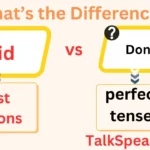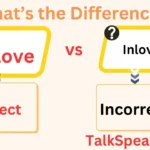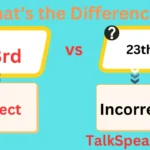Misusing common phrases can be confusing, especially when they carry powerful meanings, like in love.
Many people mistakenly use inlove, thinking it’s correct. However, grammar rules and language conventions tell a different story.
The correct phrase is in love—two separate words, not inlove or in-love.
In this guide, we’ll break down the proper usage of in love, why inlove is incorrect, and how to avoid common mistakes.
Is “Inlove” Correct?
When you type “inlove” into a document or search engine, it’s often flagged as a misspelling.
That’s because inlove is grammatically incorrect.
Why “Inlove” is Incorrect
- Grammatical Structure:
The phrase in love consists of two separate words. The preposition in connects with the noun love to form a phrase that describes a state of affection or admiration.- Example: “She is in love with him.”
- Language Evolution:
Historically, English has treated in love as a set phrase rather than a compound word. This separation reflects clarity and readability. - Digital Influence:
The rise of texting and social media has encouraged shortened spellings and phrases. While inlove might seem like a convenient shorthand, it’s not recognized in formal writing.
Correct Usage: “In Love”
Let’s dive into the correct usage of in love to understand why it’s the only acceptable form.
Definition and Meaning
Being in love refers to an emotional state where someone feels affection, admiration, or romantic attraction toward another person. It can also apply to things or activities you deeply enjoy.
- Romantic Context:
- Example: “They fell in love during college.”
- Meaning: A mutual emotional connection rooted in affection and admiration.
- Non-Romantic Context:
- Example: “I’m in love with this song; it’s been on repeat all day.”
- Meaning: Expressing enthusiasm or deep appreciation for something.
Grammar Breakdown
The phrase in love functions as a prepositional phrase:
- In: Preposition indicating a state or condition.
- Love: A noun representing the emotional or affectionate state.
This structure is common in English. For example:
- In trouble
- In awe
- In debt
Examples in Context
To help clarify, here are examples demonstrating correct usage:
| Scenario | Example Sentence |
|---|---|
| Romantic | “He said he was in love with her.” |
| Non-romantic | “I’m in love with these shoes—they’re perfect!” |
| Hypothetical | “Could they be in love, or is it just infatuation?” |
Synonyms and Related Phrases
If you’re looking for ways to express similar emotions or concepts, here are some synonyms and related phrases:
Synonyms
- Adore: “She adores him like no one else.”
- Infatuated with: “He’s infatuated with the idea of adventure.”
- Crazy about: “They’re shocking about each other.”
- Head over heels: “She’s head over heels in love with him.”
Related Expressions
- Madly in love
- Hopelessly devoted
- Falling for someone
These phrases add variety to your language and deepen emotional expression.
Why “In-Love” is Also Incorrect
You may occasionally see in-love written with a hyphen, but this too is incorrect. Here’s why:
- No Hyphenation Rule:
English grammar doesn’t support the hyphenation of prepositional phrases like in love. Hyphens are typically reserved for compound adjectives (e.g., “well-known author”). - Confusion with Adjectives:
Using a hyphen could imply that in-love is a single descriptive adjective, which it’s not.- Incorrect: “She’s an in-love woman.”
- Correct: “She’s a woman in love.”
- Examples of Misuse:
- Incorrect: “They’re so in-love it’s adorable!”
- Correct: “They’re so in love it’s adorable!”
Practical Tips to Avoid Mistakes
Here’s how you can ensure you always use in love correctly:
Proofreading Strategies
- Read Aloud: Hearing your sentences can help you catch awkward phrasing or errors.
- Use Grammar Tools: Tools like Grammarly or Hemingway Editor can identify errors like inlove.
- Consult Dictionaries: Reliable resources like Merriam-Webster or Oxford English Dictionary confirm the correct form.
Quick Memory Aids
- Split it: Think of in and love as separate pieces.
- Visualize: Picture someone standing in a pool of love.
Common Scenarios to Watch For
| Situation | Correct Usage | Incorrect Usage |
|---|---|---|
| Writing a love letter | “I’m deeply in love.” | “I’m deeply inlove.” |
| Expressing enthusiasm | “I’m in love with it.” | “I’m inlove with it.” |
| Describing feelings | “They’re in love again.” | “They’re inlove again.” |
FAQs About “In Love”
Here are some common questions people have about this phrase:
Q: Is “inlove” ever acceptable?
A: No, inlove is not considered correct in English. Always use in love as two separate words.
Q: Can “in love” apply to non-romantic situations?
A: Absolutely! You can be in love with hobbies, places, or even food. Example: “I’m in love with Paris—it’s magical.”
Q: How do you use “in love” in formal writing?
A: Use it sparingly and appropriately. For instance, in a business context, you might write, “Our customers are in love with our new product.”
Conclusion
Understanding the difference between in love and inlove is vital for clear, effective communication. The correct form, in love, reflects both grammatical accuracy and cultural norms, while inlove and in-love remain errors to avoid.
By mastering this distinction, you’ll not only elevate your writing but also gain confidence in expressing emotions authentically and accurately. Always remember: two words, not one!

Amelia Harris, a passionate educator, simplifies English grammar and vocabulary for learners of all levels. With her engaging style, mastering English has never been easie




